

Home Page
The latest articles, features and news.


Read About...


Search Articles



Discussion Forums




|
| | |
|
28 November 2011
Well-done meat fuels prostate cancers
by George Atkinson  The association between meat consumption and prostate cancer has been further strengthened with new findings showing a positive link between the consumption of well-done meats and aggressive prostate cancers.
The association between meat consumption and prostate cancer has been further strengthened with new findings showing a positive link between the consumption of well-done meats and aggressive prostate cancers. Lead researcher John Witte, of the University of California - San Francisco, said that the correlation was primarily driven by red meat that was grilled or barbequed, especially when well-done. Past studies that have assessed the impact of dietary factors - including meat consumption - on prostate cancer have given mixed results. Witte said the new findings, published in the journal PLoS ONE, were based on an assessment of the meat consumption habits of 1,000 male participants. Specifically, he looked at grilled or barbecued beef and hamburger, and how well-done the meats were. The research team found that among the cooking methods they investigated (grilled/barbequed, pan-fried, microwaved and broiled), only meats that were grilled/barbequed showed a significant association between meat consumption and prostate cancer. This association was even stronger when looking at men with advanced prostate cancer, with a 36 percent higher risk of advanced prostate cancer in the highest quintile of meat consumption compared to the lowest.
Witte believes the increased risk of prostate cancer is due to higher levels of carcinogens in meat that is barbequed. "The mechanism through which the consumption of well-done meat may increase prostate cancer risk is via the release of mutagenic compounds during cooking. Heterocyclic amines and polycyclic aromatic hydrocarbons are chemicals formed when muscle meat such as beef, pork, fish or chicken are cooked by high temperature methods such as pan frying or cooking over an open flame. Polycyclic aromatic hydrocarbons [PAHs] develop from smoking or grilling meat over an open fire. Fat and juices from cooking meat drip into the fire, causing flames that contain PAHs to coat the surface of the meat. Heterocyclic amines are mutagenic compounds formed during high temperature or long cooking of meat," he explained. The study cautions that other (so far unidentified) molecules may also increase risk and further studies are required to better characterize the potential role of these compounds in prostate carcinogenesis and to see whether any of these compounds may be targeted for the treatment of prostate cancer. Related:
Discuss this article in our forum
Diet And Lifestyle May Reverse Prostate Cancer
Diet And Stress Key Factors In Prostate Cancer Progression
Restricting carbs appears to slow prostate tumor growth
Source: Public Library of Science
|
|





